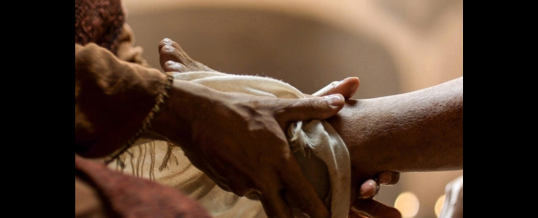
This gospel story of the foot washing is like all other gospels stories—it’s full of symbolism. Once I think I’ve got its meaning, I soon realize there’s a deeper meaning that I am being called to. And if I respond to this greater calling, I usually only do it with the greatest of reluctance. Afterall, who of us, honestly, likes to be shaken out of our comfort zone? I certainly don’t. In that sense, Peter, in his reluctance to have his feet washed represents every one of us. Jesus, on the other hand, lived totally without a comfort zone, almost like a street person. He even told us as much when he said, “the Son of man has no place to lay his head” (Mt. 8:20). Shepherds who go to the edges to find their sheep usually don’t have a place, in the comfortable middle, to lay their heads.
I think when Jesus removes his outer garment, just prior to washing his Apostles’ feet, it wasn’t simply a physical gesture. He wasn’t doing it because the outer garment was in the way of him stooping down and washing someone’s feet. There are lots of interpretations of why does this, but maybe this could be one interpretation.
Underneath our clothing, our costumes, our job descriptions, our titles, our clerical vestments—underneath all the things we’ve attached ourselves to and said, “That’s me!”—underneath all of the that, we are all the same. That takes a lot of honesty and humility for some people to admit. Jesus never ascribed to himself any special title. Just the opposite. Though he was in the form of God, he did not regard equality with God as something to be grasped, but emptied himself, taking on the form of a slave (Phil. 2:6). Before Jesus gives us the lesson at the end of the foot washing that we ought to follow his example and do as he did for us, we are given a hint about where all of this is going when he takes off his outer garment.
Here’s what Fr. Ron Rolheiser writes. “In order to let go of the pride that blocks any human being from stooping down to wash the feet of someone different from himself, Jesus had to strip off a lot of outer things (pride, moral judgment, superiority, ideology, and personal dignity) so as to wear only his inner garment. What was his inner garment? As John mystically describes, his inner garment was precisely his knowledge that he had come from God, was going back to God, and that therefore all things were possible for him, including washing the feet of someone of whom he really knew had betrayed him…like Jesus, we too have come from God, are returning to God, and therefore are capable of doing anything, including loving and washing the feet of someone very different from ourselves.”
Tonight, above all nights, there are to be no differences between us. No Jew nor Greek. No slave nor free. No male nor female. No clergy nor laity. No rich nor poor. No healthy nor sick. Let the policeman become the arrested. Let the priest sit in the pew. Let the teacher sit at a regular desk with the students. Let the company C.E.O. grab a mop to clean the floor. Let the judge sit with the accused in the dock. Let the army general go to the front line. Let the one with a secure job join the line of the unemployed. Let those who are willing to cast stones join the woman caught in adultery. Let those who have lots of friends venture into the world of the lonely and depressed. Let the one who has lived here, all their life, join the frightful immigrants. There comes a time when it is time to turn in our cherished moral placards for a basin and a towel. Tonight is that night.
The rabbi addressed his students with the question, “When can you tell the night has ended and the day has begun?”
One of the rabbi’s students offered the reply: “When you can see a tree in the distance and tell if it is an apple tree or a pear tree.”
The rabbi answered, “No.”
Another student responded: “When you can see an animal in the distance and can tell if it is a sheep or a dog.”
Again, the rabbi said, “No.”
“Well,” his students protested, “When can you tell, that the night has ended, and the day has begun?”
And the rabbi responded, “When you can look on the face of any man or woman and see that he is your brother, that she is your sister—because if you cannot, no matter what time of the day it is, it is still night!”
Tonight sits before you, your brother who made all the wrong moves, all the wrong decisions, but he has come home. We need to put a ring on his finger, sandals on his feet, kill the fatted calf and celebrate. We need to wash his feet.
Tonight sits before you, your sister, who also is far from perfect. None of us can throw a stone against her and call ourselves righteous. She is our sister. We need to wash her feet.
Tonight there are no saints nor sinners. There are only people, people who make mistakes in trying to love and trying to be loved. Tonight there are only sinners. Sinners redeemed by One who first washed our feet.
~Fr. Phil
APR
2025

About the Author: